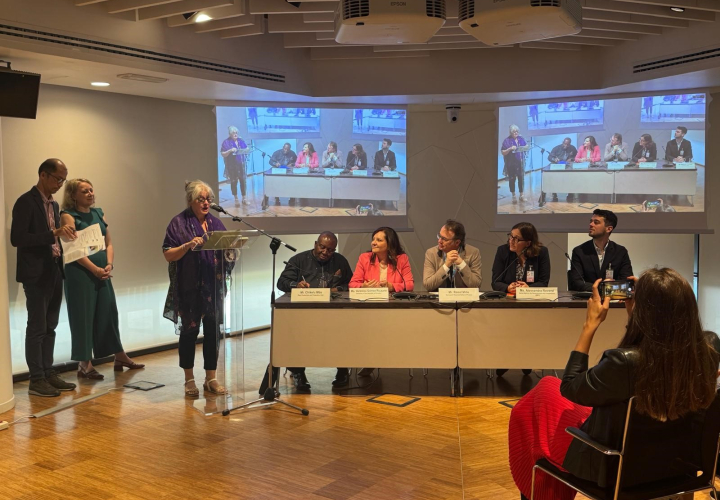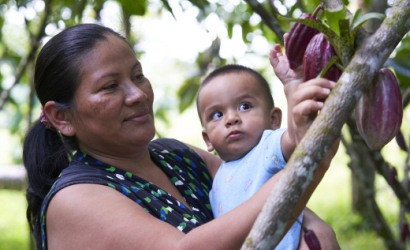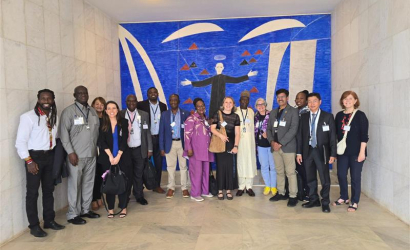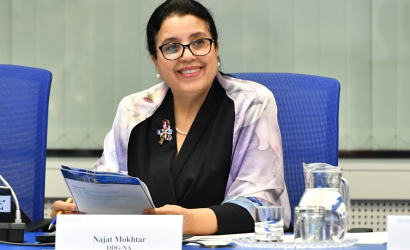HDSFS Coalition event at Rome Nutrition Week
Enhancing Policy Coherence Towards Delivering Healthy Diets Through Agroecological Practices: A Global Call for Integrated Action
During the second annual Rome Nutrition Week on May 27th, global stakeholders took part in a side event to discuss the use of agroecological practices to promote healthy diets and transform food systems sustainably and equitably. Co-organized by the Agroecology and HDSFS Coalitions, the event featured representatives from governments, civil society, youth, academia, and international organizations. Delegates from Ecuador, France, Sierra Leone, Switzerland, and Tanzania shared national experiences and policy innovations focused on aligning development agendas for sustainable food systems transformation.
Mr. Oliver Oliveros, Executive Coordinator of the Agroecology Coalition, and Ms. Anna Horner, Senior Coordinator at UN-Nutrition and HDSFS representative co-moderated the session. They highlighted the strong scientific links between nutrition and agroecology, emphasizing how integrating these fields can lead to improved outcomes in food systems.
Evidence and Advocacy: Connecting Agroecology and Nutrition
Mr. Chike Mba, Deputy Director of the Plant Production and Protection Division (NSP) at FAO, noted that despite challenges, there is consensus on issues like food insecurity, hunger, malnutrition, and the cost of healthy diets, according to the latest State of Food and Agriculture in the World (SOFI) report. The NSP Division links its work to nutrition by promoting nutrient-dense crops and diversified cropping systems within an agroecological framework. He emphasized that agroecology shortens food value chains and supports locally produced foods. He also highlighted the FAO Agroecological Knowledge Hub as a resource offering knowledge and support for integrating agroecological practices.
Ms. Rachel Beznel Kerr, Professor at Cornell University, presented agroecology as a transformative approach to improve nutrition based on key principles from the UN High Level Panel of Experts’ report and literature review which found that 78% of studies reported positive impacts of agroecology on food security and nutrition. Drawing on her research with smallholder communities in Malawi and Tanzania, she showed how agroecological methods improved food security, dietary diversity, livelihoods, and well-being, especially for women and children. She concluded that agroecology positively impacts nutrition through multiple pathways but called for more research, especially in urban settings.
Stakeholder Panel Discussion: Local Innovations, Global Lessons
Mr. Raoul Mille, Scientific Counsellor of France to the UN in Rome, discussed integrating agroecology into climate and biodiversity strategies to achieve the 2030 Agenda. He emphasized the need for political leadership and cross-sector collaboration, highlighting France’s national strategy for food, nutrition, and climate under the 2021 Climate Resilience Act. This strategy ensures coordinated governance of policies related to food, health, and the environment, guaranteeing sustainable, quality food for citizens. He also highlighted agroecology as a key tool for climate adaptation and nutrition, noting the strategy’s integration of the One Health approach and agroecological methods to support farmers while protecting ecosystems.
Ms. Aminata Shamit Koroma, Director of Food and Nutrition, Ministry of Health in Sierra Leone, joined online to highlight efforts promoting agroecological practices in rural and urban areas. She shared the Feed Salon policy initiative, aiming to increase local production, reduce food imports, and build resilience. Empowering women and youth through climate-smart agriculture training is a key focus, emphasizing that, “We need to eat what we grow and reduce hunger and malnutrition.” Coordinating this strategy across government sectors and coalitions like SUN and HDSFS strengthens collaboration to tackle malnutrition and empower women farmers. She also shared the First Foods initiative, supporting nutritious complementary foods for mothers and children to reduce malnutrition.
From Ecuador, Deputy Permanent Representative to the FAO, H.E. Ms. Veronika Gomez Ricaurte shared how the country is embedding agroecological principles into national food security and nutrition strategies. She highlighted the diversity of indigenous populations protecting biodiversity and traditional farming methods. Ecuador’s Ministry of Health developed toolkits and policies prioritizing culturally appropriate nutrition through interministerial and community consultations, focusing on human rights, noting that “without the organization of indigenous communities, it would not have been possible.” She concluded that successful policies like food labeling and Food-Based Dietary Guidelines are driven by an agroecological approach centering biodiversity and ancestral farming alongside nutrition campaigns.
From Tanzania, Ms. Gladness Brush Martin, Programme Coordinator at SWISSAID, highlighted grassroots efforts to promote agroecological farming. Since 2021, SWISSAID has launched projects to improve food security of smallholder farmers, especially women, by promoting diverse local crops through agroecological practices that improve nutrition and soil health. The initiative creates consumer demand and certifies farmers to build economic capacity. She shared Tanzania's National Ecological Organic Agriculture Strategy, implemented alongside efforts to embrace technology among farmers. She concluded with a call to action: “Let’s build food systems that honor farmers, biodiversity, and prioritize people and the planet.”
From a bilateral donor perspective, Ms. Alessandra Roversi, Programme Officer at SDC, shared the state of funding for nutrition and healthy diets, highlighting Switzerland’s dual approach of training and employment. She noted investments remain largely sectoral, while agroecology enables co-benefits for climate, nutrition, and health. “Nutrition will enable agroecology to retain a personal dimension in decision-making,” she said, framing agroecology as a social movement fostering alliances between farmers, consumers, and companies. She mentioned legal repercussions and recommended lawsuits when action isn’t taken, creating an entry point for agroecological demands. She concluded with a call to focus on prevention and for development banks to set criteria to invest in, pilot, monitor, and assess agroecology and nutrition initiatives.
Mr. Edoardo Corriere, Global Programme Coordinator at YPARD, highlighted youth’s role in transforming food systems through agroecology for sustainability: “Efforts must consider the key role young professionals play, not only as future leaders but as present-day change makers.” As an example of this, he spoke about YPARD’s Global Program for Small Scale Agroecology Producers, implemented in Ecuador, Costa Rica, Madagascar, and Uganda. The program empowers 10,000 small-scale producers by focusing on youth through advocacy, capacity-building, and networking, sharing an example from Madagascar that showcased cross-sector collaboration. He called to ensure food systems are shaped by youth, not just for youth.
Key Takeaways and Forward Path
To close the session, Ms. Lina Mahy from WHO’s Department of Nutrition and Food Safety, part of the tri-partite Secretariat of the HDSFS Coalition with FAO and UN-Nutrition, highlighted the alignment of agroecology and public health goals, referring to the UN Decade of Action on Nutrition. She summarized interventions showing that including political and gender dimensions in agroecological programs increases effectiveness and equity. She reaffirmed youth, civil society, and academia’s role in driving innovation and accountability. Facing climate change and malnutrition, the call is clear: agroecology must be central to food systems transformation. Access to healthy food is a right, guiding representatives. By aligning policies and fostering collaboration, we can build a future where healthy diets and sustainable agriculture benefit human and planetary health.



